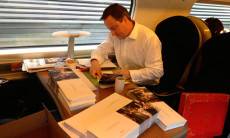October 31, 2013
New report identifies the ten key trends set to transform US commercial property
 According to a new report from Deloitte, the recent upturn in the US commercial real estate sector is set to continue unabated into next year. Which is great news but according to the property consultancy, the market that emerges from the ashes of the downturn will be very different to the one from which they were formed. Deloitte’s 15th annual Commercial Real Estate Outlook report has identified what it considers the top ten trends that will reshape the emerging market based on a mixture of original research, subjective insights and the firm’s experience with clients. These trends are dominated by structural and financial issues and the only nods towards external socio-economic factors are mentions for the aging workforce within the market (so much for the transformational potential of GenY) and increases in single family households (can’t see the link with commercial property).
According to a new report from Deloitte, the recent upturn in the US commercial real estate sector is set to continue unabated into next year. Which is great news but according to the property consultancy, the market that emerges from the ashes of the downturn will be very different to the one from which they were formed. Deloitte’s 15th annual Commercial Real Estate Outlook report has identified what it considers the top ten trends that will reshape the emerging market based on a mixture of original research, subjective insights and the firm’s experience with clients. These trends are dominated by structural and financial issues and the only nods towards external socio-economic factors are mentions for the aging workforce within the market (so much for the transformational potential of GenY) and increases in single family households (can’t see the link with commercial property).













 The finest closing sentence of any novel in my opinion is that in The Great Gatsby. “So we beat on, boats against the current, borne back ceaselessly into the past.” It is a reference to the futility of our attempts to escape the past, even as we look to the future, dreaming of how “tomorrow we will run faster, stretch out our arms farther”. F Scott Fitzgerald was referring to people when he wrote it, and Jay Gatsby in particular, but it’s a passage that resonates in a number of ways, especially in those areas of our lives that deal most intimately with what it means to be human. And one of these is self-evidently the workplace, where any articular attempt to define the ideal office for a particular time, including the future, is complicated by the fact that we must always meet the needs of the beasts that inhabit it. Regardless of the tools we have at our disposal with which to work more effectively, or just plain ‘more’ we remain fundamentally the same animals we were thousands of years ago.
The finest closing sentence of any novel in my opinion is that in The Great Gatsby. “So we beat on, boats against the current, borne back ceaselessly into the past.” It is a reference to the futility of our attempts to escape the past, even as we look to the future, dreaming of how “tomorrow we will run faster, stretch out our arms farther”. F Scott Fitzgerald was referring to people when he wrote it, and Jay Gatsby in particular, but it’s a passage that resonates in a number of ways, especially in those areas of our lives that deal most intimately with what it means to be human. And one of these is self-evidently the workplace, where any articular attempt to define the ideal office for a particular time, including the future, is complicated by the fact that we must always meet the needs of the beasts that inhabit it. Regardless of the tools we have at our disposal with which to work more effectively, or just plain ‘more’ we remain fundamentally the same animals we were thousands of years ago.







October 30, 2013
IT managers yet to accept the whole challenge presented to them by BYOD
by Brandon Allen • Comment, Technology
(more…)